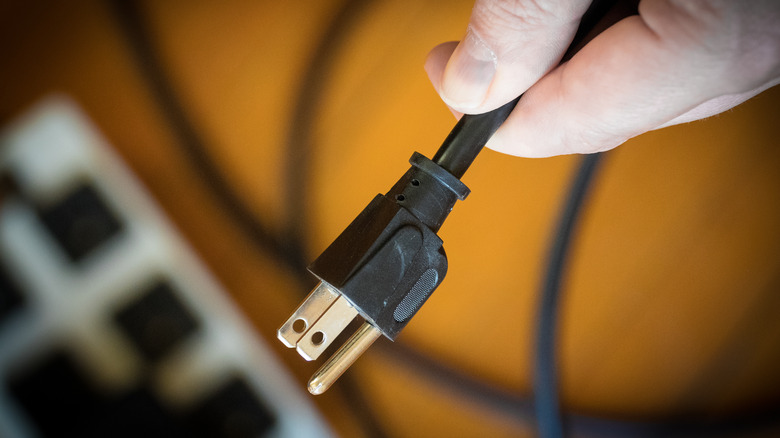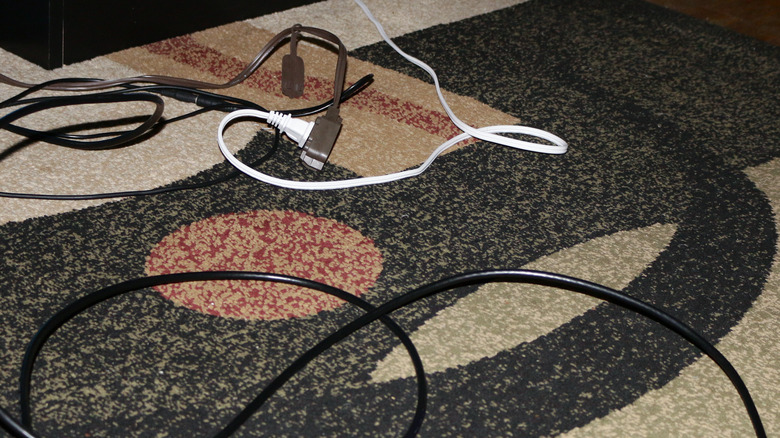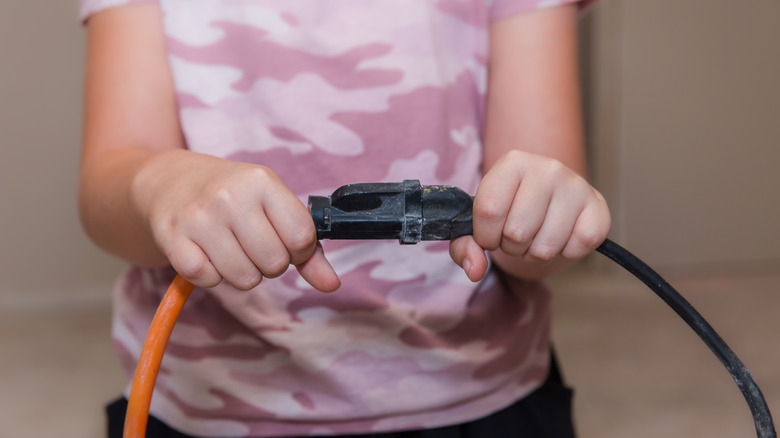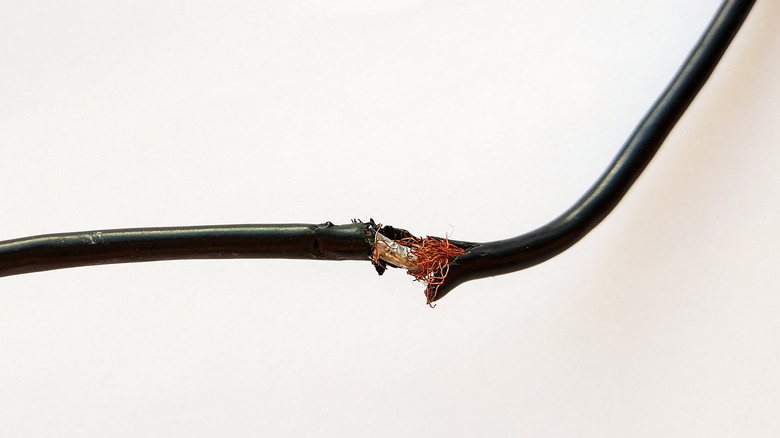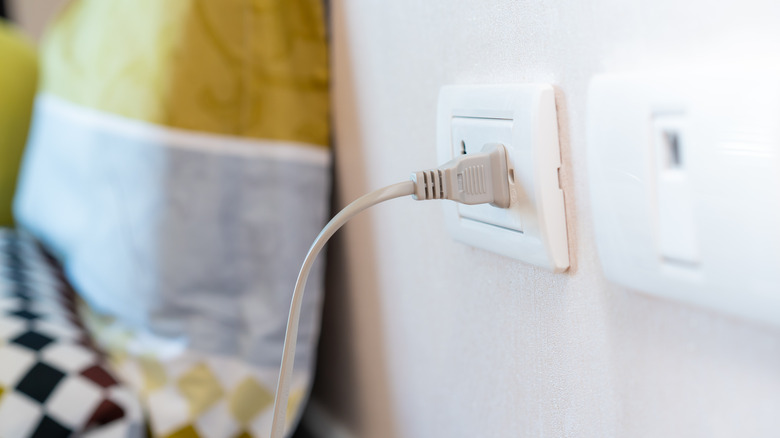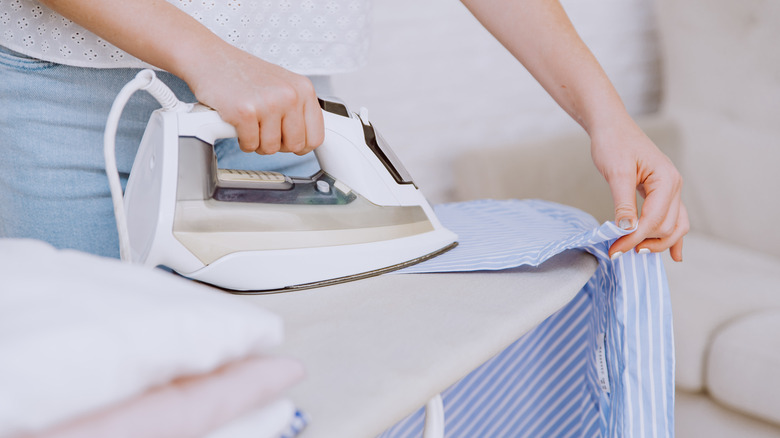These Are The Places You Should Never Use Extension Cords
If you're like most people, you are probably using at least one extension cord in your home. From helping lamp cords reach an outlet to using electric power tools outside, extension cords are a practical, easy fix. While they can make life easier, you should know there are places you should never use them.
Extension cords range from light-duty to heavy-duty. Light-duty cords look like electric cords on lamps and are two-pronged, according to The Spruce). Light-duty cords should always be used with light-duty appliances (hence the name). Medium-duty cords have a third prong, and they should be used with items that also have three prongs. When it comes to heavy-duty cords, they also have a third plug prong. They're generally thicker than light and medium-duty cords, because they are made for using more amps (via Homes.com). Regardless of the type, all extension cords have limitations you should respect in order to avoid fire or injury. Now that you're up to speed, let's get into the places you should never use extension cords.
Don't use cords in walls, ceilings, floors, or carpeting
Extension cords aren't meant for long-term use, because they deteriorate quickly over time. For this reason, you should never use them in long-term situations. For instance, if you are building or adding on to your home, never use an extension cord through a wall. Likewise, don't place a cord in the ceiling where it could be exposed to extreme temperatures. Under floors is another place where extension cords should never be used (via Electrical Safety Foundation International). Don't staple or nail extension cords to walls or floors, because doing so could damage the wires inside and degrade them (via Indiana Electric Cooperatives).
While they might be unsightly, you should never place any type of extension cord under a rug or carpeting, as they might overheat and become a fire hazard (via U.S. Consumer Protection Safety Commission). In addition, you are more likely to step on an extension cord hidden under a rug, which will cause it to wear out much quicker.
Don't string extension cords together
Regardless of whether you are using extension cords inside or outside, you should absolutely never plug multiple cords together. While at first glance, this might seem like a quick solution to a problem, doing so can potentially create an extremely dangerous situation given the way extension cords are made. As you might have noticed, cords come in different lengths by which they are rated. Shorter cords can conduct more current than longer cords, according to Homes.com, so it make perfect sense to use a short cord when you can. That being said, you should never opt for plugging two short cords into each other when you're in need of a longer one. When you plug two cords together, their capacity is decreased by 50%. Plugging two or more cords together could also result in overheating, fire, or even electrocution, according to Occupational Health & Safety.
Don't plug hot or damaged extension cords into any outlets
Just like most things, as extension cords age, they deteriorate. If any cord ever feels hot (on the cord itself or the plug), it is time to replace it and get a new one. Additionally, you should never use a cord that is frayed, cracked, or damaged in any way, according to Safe Electricity. While it may be tempting to use tape to cover a damaged section of a cord, absolutely do not do this, because the cord could still overheat. It is better to replace the cord ASAP and avoid any mishaps.
While on the topic of replacing cords, you should replace them regularly, because they are not meant to be used long-term. Extended use could turn them into fire hazards and could also cause shock (via Electrical Safety Foundation International). It is also recommended to check your cords frequently for any kind of damage.
Keep indoor extension cords inside, and don't get them wet
Do not, by any means, use an indoor extension cord outside — simply grab an outdoor extension cord for the task! Make sure you read the label on the extension cords when you're doing your shopping, and purchase the right one for the job. Keep a close eye on your outdoor cords, as they are subject to nonstop wear and tear. A bare wire could result in an electrical fire, electrical shock, or burn, according to Safe Electricity.
Whether indoors or outdoors, extension cords should absolutely never get wet, because water conducts electricity, and a wet cord might electrocute or shock someone if it is touched or handled improperly. Moreover, light-duty cords are not meant to handle the heavy wattage that some outdoor tools and appliances use. Using a light-duty extension cord with a heavy-duty tool could make it overheat and result in a fire (via Safe Electricity).
What items should never be used with extension cords
While extension cords are awesome, they are simply not made for every appliance or gadget in your home. As a matter of fact, there are some items that should never be used with extension cords. According to Homes.com, hair dryers, coffee pots, irons, toasters, treadmills, and space heaters should always be plugged directly into a wall socket. The reason why has to do with the fact that all of these items generate a substantial amount of heat on their own, using quite a bit of amps. Most of these items are also used indoors, meaning they pull more amps than a light-duty extension cord is capable of handling. So, while it might be tempting to use an extension cord to help the ironing board reach an outlet on the other side of the room, you should definitely ditch it for the above appliances, and simply move closer to the outlet.
